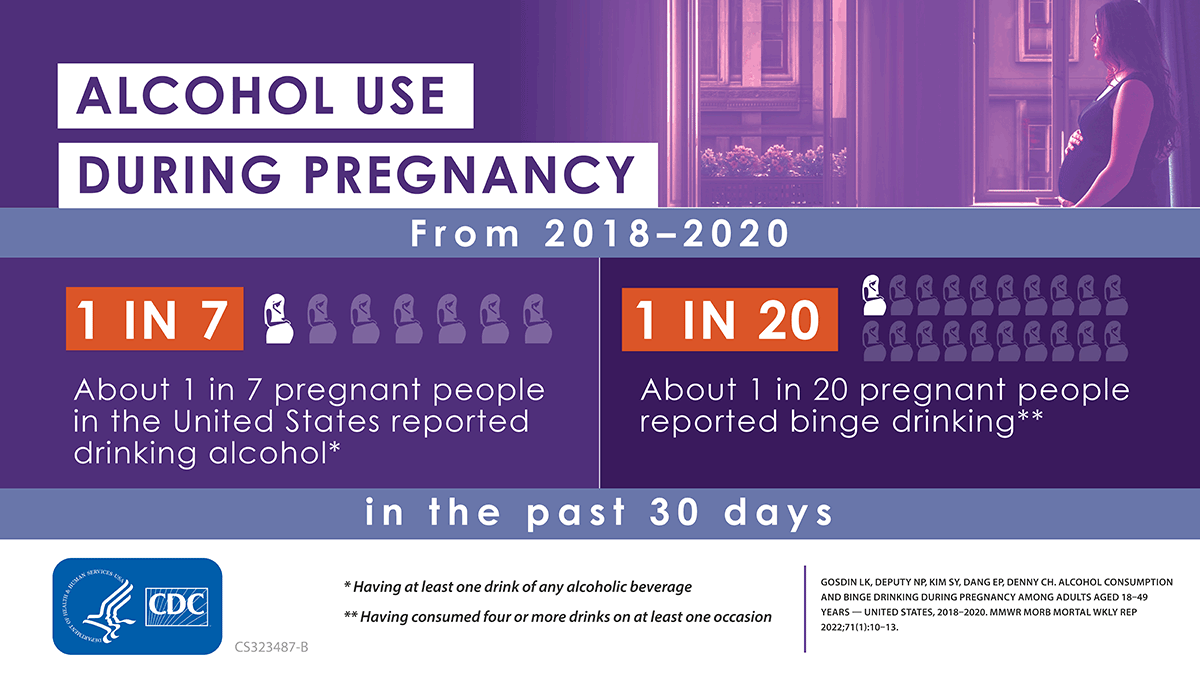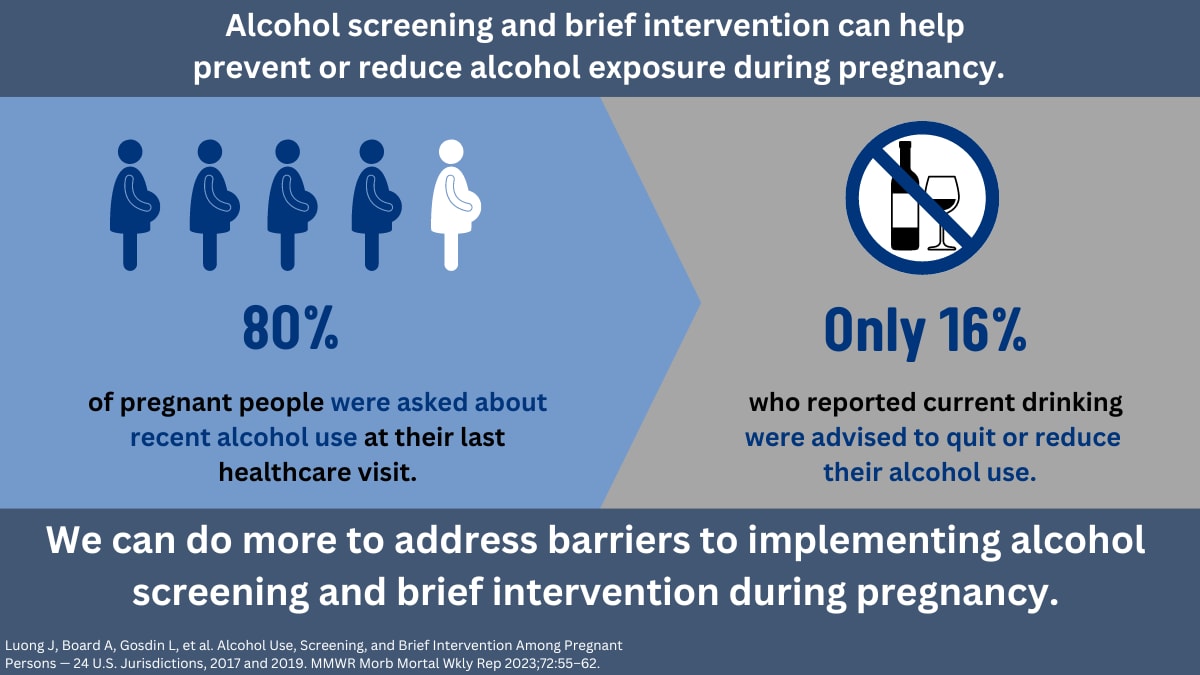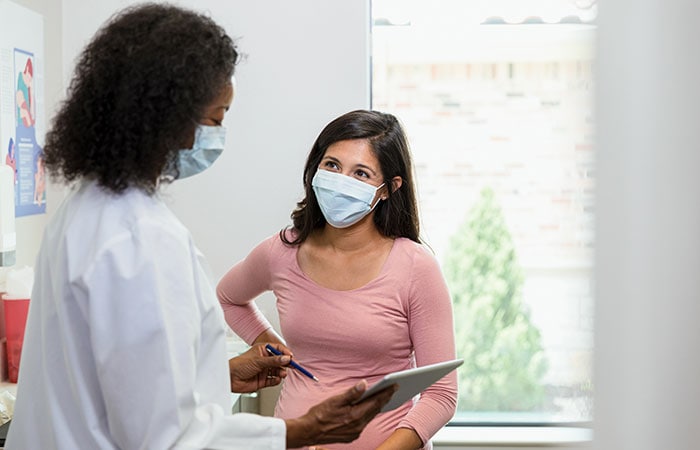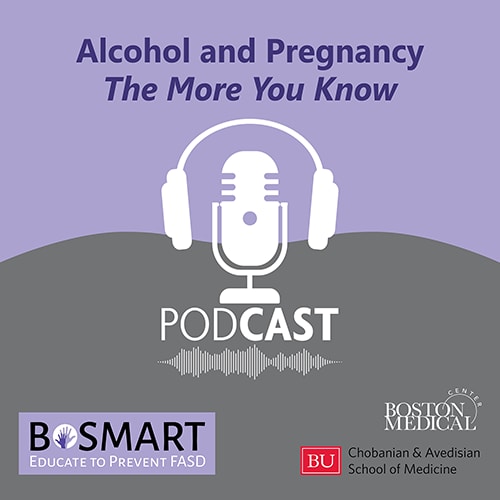Alcohol Use During Pregnancy and FASDs

April is Alcohol Awareness Month
Fetal alcohol spectrum disorders (FASDs) are a group of conditions that can occur in a person who was exposed to alcohol before birth. FASDs have lifelong effects, including problems with behavior and learning as well as physical problems. FASDs are preventable if a developing baby is not exposed to alcohol.
There are resources available to help prevent alcohol use during pregnancy and provide care for children with FASDs and their families.
What Do We Know?

In a 2022 Morbidity and Mortality Weekly Report (MMWR), CDC researchers found that nearly 1 in 7 pregnant people reported current drinking* and about 1 in 20 reported binge drinking** during the past 30 days. Pregnant people who experienced frequent mental distress (14 or more days of poor mental health in the past 30 days) and those who did not have a usual healthcare provider were more likely to report alcohol use.
*having at least one drink of any alcoholic beverage
**having consumed four or more drinks on at least one occasion

In a 2023 Morbidity and Mortality Weekly Report (MMWR), CDC researchers found that 80% of people who were pregnant were asked about alcohol use; however, only 16% of those who self-reported drinking within the past 30 days were advised to quit or reduce their use. These findings highlight missed opportunities to integrate alcohol screening and brief intervention (SBI) in practice, utilize strategies to address recognized barriers (e.g., improving reimbursement for alcohol SBI), and to help reduce alcohol use during pregnancy.
What Can Be Done?
Tools for Healthcare Providers

CDC and its partners have resources to help prevent alcohol use during pregnancy and provide care for children with FASDs and their families.
Tools are located here for healthcare providers working in
- family medicine,
- medical assisting,
- nursing,
- obstetrics and gynecology,
- pediatrics, and
- social work.
Training and Awareness
- Two seasons of the podcast “Alcohol and Pregnancy: The More You Know” are available.
- Episodes include
- interviews with experts in the field,
- people with lived experience,
- patient advocates, and
- demonstrations of difficult conversations with patients.
- Each season offers free continuing education credits (CME, CNE) through Boston University Chobanian & Avedisian School of Medicine.
- Episodes include
- FASD United (formerly NOFAS) has 50 frequently asked questions about prenatal alcohol exposure and FASDs.
Looking for Help?
- Use CDC’s alcohol screening tool to check your drinking and make a plan to drink less.
- Everyone can benefit from drinking less alcohol or not drinking at all. This tool can help you check your drinking and can give advice. If you want to drink less, it can also help you build a plan to make healthier choices.
- If you are pregnant or trying to get pregnant and cannot stop drinking, help is available. Contact your healthcare provider, local Alcoholics Anonymous®, or local alcohol treatment center, and check out these resources.
- FASD United (formerly NOFAS)
FASD United provides a variety of supports and resources for people experiencing prenatal substance exposure and FASDs.- The Family Navigator program provides individuals living with FASDs and their family members and caregivers with expert, confidential support and referrals. This service is free and does not require a referral. FASD United also has a searchable resource directory. The directory can help families locate services related to diagnosis of FASDs; treatment for individuals and families living with FASDs; parent and family support groups; prevention programs, such as treatment for women; advocacy programs; and statewide services.
- The Circle of Hope is a network of women who have consumed alcohol during pregnancy and may have a child or children with FASDs. This network was formed to enable women to support one another. The Circle of Hope includes a national speakers bureau and mentorship to new members who may be struggling with an alcohol use disorder or grief. The network offers a weekly online support group, Recovering Mothers Anonymous, available for women who have used alcohol or another substance during pregnancy.
- Through FASD United, you can also find a variety of resources and support for families and educators.
- SAMHSA Treatment Locator—FindTreatment.gov
The Substance Abuse and Mental Health Services Administration (SAMHSA) has a treatment facility locator. This locator helps people find drug and alcohol treatment programs in their area. - NIAAA Alcohol Treatment Navigator
The National Institute on Alcohol Abuse and Alcoholism (NIAAA) has an Alcohol Treatment Navigator. The Navigator helps adults find alcohol treatment for themselves or an adult loved one. - Alcoholics Anonymous (A.A.)
Alcoholics Anonymous® is a fellowship of men and women who share their experience, strength, and hope with each other that they may solve their common problem and help others to recover from alcoholism. Locate an A.A. programnear you.
- FASD United (formerly NOFAS)
